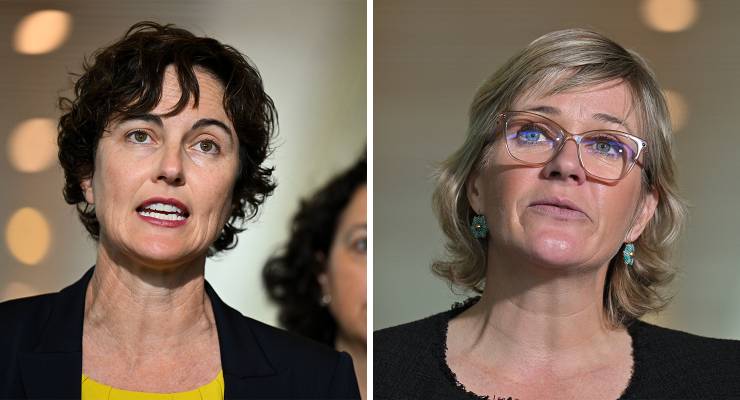
Amid the doldrums of the defeat on Saturday night of Anthony Albanese’s boldest election commitment, the prime minister betrayed for a moment what he truly thought of the terms on which the referendum was fought.
“I think during this campaign, we have had a very clear proposition of just two things — recognition, and a non-binding advisory committee — and we’ve had, including in outlets represented in this room, discussions about a whole range of things that were never anything to do with what was on the ballot paper tonight.
“We had pages and pages and weeks and weeks donated to those issues and how they were portrayed. For many people, it became an issue in which they were receiving a range of information.”
Much like the 2016 and 2019 election losses for Labor, it was, for Albanese, the media landscape that was to blame — and while the campaign, described as “fraught and acrid”, was filled with rampant disinformation and misleading claims about the Voice proposal, he had no shortage of opportunity to address the Yes campaign’s biggest handicap.
Having campaigned on the issue in 2019, the Labor Party has, since forming government, not moved on the issue of truth in political advertising laws, and it is only after the fact of a comprehensive defeat at the ballot box that it has wrung its hands in sombre reflection of the state of the media landscape in this country.
The insincerity with which the country’s fourth estate approached the referendum has been lambasted as the key to the Yes campaign’s loss, but it could have been avoided, MPs and academics said.
“If truth in political advertising laws had been in place for the referendum, campaigners would have been more reluctant to produce misinformation,” Bill Browne, director of the democracy and accountability program at the Australia Institute, told Crikey.
“Misleading political advertising marred the Voice referendum and led to confusion, fear and mistaken beliefs about what the Voice to Parliament represented and what its powers would be. Without truth in political advertising laws, there is a risk the next federal election will be a fake news free-for-all.”
Browne said South Australia has had truth in political advertising laws for almost 40 years, introduced under the Bannon Labor administration: “The observed effect is that they lift the quality of debate and nip misinformation campaigns in the bud.
“Truth in political advertising laws work across several fronts: setting a cultural expectation that lying is not tolerated, stopping misleading ad campaigns, providing an independent umpire’s ruling that content is in fact misleading and deceptive, imposing a financial penalty and, potentially, allowing for an election to be held again if misleading advertising skewed the final result.
“Invalidating election results is only one of several effective remedies.”
South Australia’s Electoral Act includes penalties of fines for misleading political advertising, as well as the potential for electoral results to be invalidated by the Court of Disputed Returns, should the court find on the balance of probabilities that the election result was affected sufficiently by the material in question.
Independent MP Zali Steggall says the warning signs were clear for the government. She told Crikey: “It was essentially one of the first things coming in as a non-politician that I was most shocked about in 2019 — the fact that there were just no standards.”
There is a bill before the house, tabled by independent MP Kate Chaney, that although based on the South Australian model, lacks the mechanism of invalidation.
Steggall sponsored the bill and says legislators need to act with caution: “The way this legislation needs to work is by deterrence. I think entering into disputing outcomes of elections, I think becomes dangerous territory of presuming which facts ultimately determine a voter’s intentions.
“What we want to make sure is that when they are voting, they’re doing it [based] on factual information.”
Steggall previously tabled a bill to the house in November 2022, almost identical to Chaney’s, and said the government has dragged its feet on the issue, despite indicating it supported it in principle.
“I amended [the bill] to include referendum processes and tabled it [in November] to ensure that it could be put in place prior to the referendum so that we could have a standard around that,” she said. “And obviously, the government put forward other legislation amending the processes around the referendum — so there was plenty of opportunity to support my bill or put up something equivalent.
“They’ve quite arrogantly just kind of said, ‘Not now, it’s not needed,’ despite the fact that they’ve actually supported that in principle and indicated that they support legislation against misinformation and disinformation.”
Steggall warned the government against trading away changes to truth in political advertising laws (which are opposed by the opposition) as part of broader changes to electoral reform, including tighter caps on electoral donations which are opposed by a number of independents.
“What we’re also aware of is, they’re in the process of negotiating a deal with the Coalition that I would argue is intended to cement the advantage of the duopoly of the major parties,” she said.
“In those negotiations, [there] could well be a change in relation to their position on truth and political advertising. So what I’m really concerned about, [is] that in looking after self-interest, they’ve really failed to protect democracy.”
In a statement to Crikey, a government spokesperson said the government would move on the issue after the final report of the Joint Standing Committee on Electoral Matters on the 2022 federal election, expected later this year.
“Electoral reform should always be consultative and bipartisan,” the spokesperson said.








This article does not address the central question of the role of the media in amplfying the misinformation and disinformation in connection with the Voice canpaign. The issue of truth in political advertising is a separate issue. To say the media would not have done it if there was a law to say it was wrong is to deny a role for principled journalism.
True to form the media are now blaming the government for running a poor Yes campaign despite the fact that it was not their campaign. Rather it was delivery of a promise to put a request to the Australian people on behalf of the first peoples. Media pundits ask why the Yes campaign could not counter the misinformation. Why indeed when the media played its usual game of false equivalence, drowning truth in misinformation and he-said-she-said reportage. We appear to live in an age when the media seems afraid to loudly speak truth to falsehood and reports untruthfulness without simultaneous rebuttal. Without this clarity of moral purpose, a simple proposal was lost in the blizzard of irrelevant, misleading and deceitful assertions.
I understand the media imperatives of using conflict as the means to print headlines that sell, but there must be a line beyond which truth and context do matter regardless of any law that sets a sminimum standard for political discussion.
The media reportage would have been entirely different if instead of:
Rufus Snurgleburger for Yes said this was a sensible proposal.
Meanwhile Gwyneth Forktounge for the No campaign said her group was worried the proposal would lead to all manner of calamities and a feeding frenzy of lawyers in the High Court
The media, empowered by truth in political campaigning laws said:
Rufus Snurgleburger for Yes said this was a sensible proposal.
Meanwhile Gwyneth Forktounge for the No campaign said her group was worried the proposal would lead to all manner of calamities and a feeding frenzy of lawyers in the High Court. The truth in politics council deemed Ms Forktounge’s claims to be a load of bollocks.
Yes even the ABC was religiously reporting the lies with the same face as the truth in the interests of “balance”
Concur 100%, not advertising but media disinfo and embedded -ve agitprop…..
That’s true – and good old Zali has been calling for both political advertising reform AND a royal commission into the media and ACMA etc
Thank you, I usually add the media and journalists in the mix because they offend, in more ways than one, continually.
Following the Referendum disaster with Dutton’s Trumpian lying campaign you would think that Albo would seriously consider truth in advertising legislation with real teeth and severe penalties. The LNP has insulted us for years with their shameless lying.
So the Coalition has to agree. Not a chance in Hades of any effective legislation being passed, then.
If South Australia has truth in political advertising, why has nothing been done about all the misleading ads shown on SA television, and about the very obvious bias shown by the Advertiser? Prosecute those who made these false statements, particularly Jacinta Price and Warren Mundine
Possibly because the SA Electoral Act only applies to South Australian elections and not to national elections or national referendums.
Precisely
Or you could just ban foreign-owned media empires.
That would be a start. But not the end. We then would have to deal with Kerry Stokes and the 9 empire.